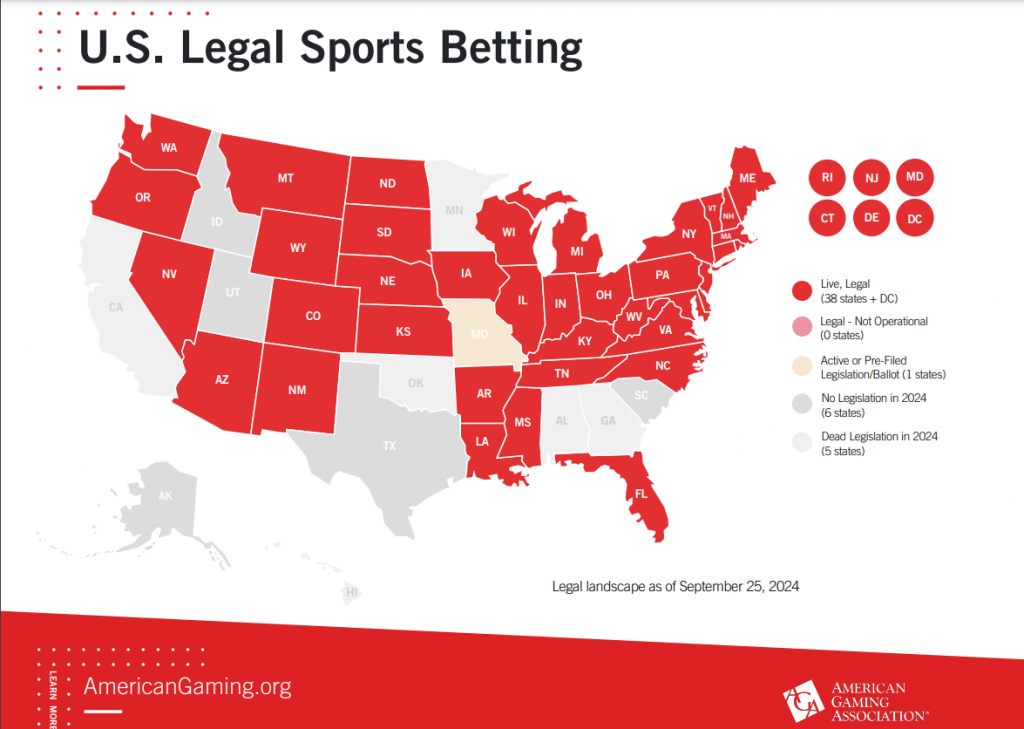States Where Online Gambling Is Legal in 2024

If you’re an online casino operator or game developer in the U.S., knowing where online gambling is legal in 2024 is vital for your business. With laws constantly changing, it’s important to understand which states allow online casinos, sports betting, and lotteries.
This blog will provide a clear overview of the current legal status across various states and point out potential markets for expansion. You’ll also find practical tips for navigating legal requirements. By staying informed, you can make better decisions for your business. Let’s dive in!
Understanding Online Gambling in the U.S.
Online gambling in the U.S. has a rich and complex history, evolving significantly. It began in the early 2000s, but federal regulations like the Unlawful Internet Gambling Enforcement Act (UIGEA) of 2006 posed significant challenges. This act made it tough for operators by prohibiting payment processing for specific gambling activities. The Federal Wire Act of 1961 also complicated things, impacting online gaming operations unexpectedly.

Despite these obstacles, pioneers like Nevada, Delaware, and New Jersey stepped up, allowing limited forms of legal online gambling. Then, in 2018, a pivotal moment occurred when the Supreme Court overturned the Professional and Amateur Sports Protection Act (PASPA). This ruling enabled states to create their own sports betting regulations, leading to swift legalisations in states like New Jersey and Michigan.
Now, in 2024, we see a transformed landscape with states actively embracing online gambling. This information is crucial for you as an online casino operator or game developer. Understanding these changes helps you identify opportunities for growth and navigate the evolving market.
Supporting Sources: Murphy vs. NCAA Supreme Court Ruling
States with Legal Online Casinos
Now that we’ve explored the history of online gambling in the U.S., let’s look at the states where online casinos are fully operational. Understanding these markets can help you identify opportunities for your business. Here’s a breakdown of key states leading the way in online gambling:
1. Delaware
- Pioneer: Legalized online gambling in 2012.
- Exclusive Provider: Rush Street Interactive became the exclusive provider in 2023.
- Platforms: Players can access BetRivers Casino, which offers a growing selection of games.
2. Michigan
- Legislation: The Lawful Internet Gaming Act made Michigan a major player in December 2019.
- Operators: Includes popular brands like BetMGM, Caesars, and FanDuel.
- Regulation: The Michigan Gaming Control Board oversees operations and ensures strict geolocation compliance to keep players within state lines.
- Impact: Tax revenue from gaming supports public services.
3. New Jersey
- Hub of iGaming: Legalized online casinos in 2013, creating a competitive market.
- Variety of Games: Operators like Borgata and Golden Nugget offer a rich selection, including live dealer options.
- Regulation: The New Jersey Division of Gaming Enforcement ensures all activities are securely regulated.
- Growth: According to Casino.org, the state continues to see significant growth in online betting.
4. Pennsylvania
- Entry: Joined the online casino market in May 2019.
- Operators: Managed by the Pennsylvania Gaming Control Board, featuring operators like Parx Casino and Rivers Casino Philadelphia.
- Success: The state-reported record tax revenues of $2.54 billion in the 2023/2024 fiscal year, as noted by the Pennsylvania Gaming Control Board.
5. West Virginia
- Launch: Entered the online casino market in 2020.
- Platforms: Offers diverse gaming options through BetMGM and FanDuel, regulated by the West Virginia Lottery Commission.
- Support: A 15% tax on casino revenues funds various state programs, helping the market thrive.
With these insights, you can see the opportunities available in these states. Understanding where online casinos operate legally can guide your strategy and help you tap into this growing market. Let’s continue exploring the states that allow online sports betting!
States with Legal Online Sports Betting
As we explore the current state of online gambling, let’s focus on the exciting growth of online sports betting in the U.S. Since the repeal of the Professional and Amateur Sports Protection Act (PASPA) in 2018; online sports betting has become a significant part of the gaming industry.

Overview of Legal Sports Betting
A total of 35 states have legalized online sports betting, each creating its own rules and regulations. This shift has opened up numerous opportunities, and states have tailored their approaches to meet local demands.
Economic Impact and Trends
States are recognising the financial benefits of legalising online sports betting. For instance, Pennsylvania reported a 29.63% increase in sports wagering revenue, reaching nearly $29.9 million as of June 2024 (source: Pennsylvania Gaming Control Board).
The expansion of online sports betting reflects a growing acceptance of these activities, with states implementing unique regulations while trying to standardize their approaches. Recent developments, such as Rhode Island’s entry into sports betting, highlight the ongoing evolution in this space. With plans to introduce online casinos, Rhode Island shows how states are transforming their gaming options.
As an operator, staying informed about these varying regulations and market dynamics is crucial for successfully entering and thriving in this competitive environment.
States with Legal Online Lottery
While only a few states in the U.S. offer online lottery services, those that do are reaping significant benefits. Here are the eight states leading the way, each with its unique approach:
- Illinois: A trailblazer, Illinois was one of the first states to offer online lottery ticket sales, focusing on daily and jackpot games.
- Georgia: Although a latecomer to the physical lottery scene, Georgia quickly gained popularity with various electronic offerings.
- Michigan: Michigan stands out with exclusive electronic scratch-offs available only online. The state’s online lottery sales have greatly increased, boosting revenue while supporting traditional retail sales.
- Kentucky: Kentucky implemented its online lottery system over three years, allowing both physical and digital ticket purchases to enhance accessibility.
- Pennsylvania: Pennsylvania offers a broad selection of online games, but it faces competition from casinos. The state successfully operates its online lottery alongside poker and sports betting.
- Virginia: Launched in 2021, Virginia’s online lottery provides a variety of games and flexible ticket purchasing options for players.
- New Hampshire: New Hampshire supports digital purchases and instant games across devices, making it easy for users to engage.
- Rhode Island: Currently finalizing its online services, Rhode Island is preparing to enter the online lottery market.

The DOJ’s 2011 reinterpretation of the Wire Act, which applies only to sports betting, has opened the door for states to legislate online lotteries. The growing presence of online lotteries shows how states are capitalizing on this revenue stream. This trend raises the question: which states might legalize online gambling next?
As an operator or developer, understanding these opportunities can help you plan effectively in this changing market. Whether you’re considering launching an online lottery or partnering with existing platforms, staying informed about state regulations is essential. Let’s now look at the states that are likely to legalize online gambling in the near future!
States Likely to Legalize Online Gambling Next
As states recognize the economic benefits of online gambling, several are considering changes to their laws. These are some states that may soon legalize online gambling:
- Arkansas: Following the legalization of sports betting in March 2022, Arkansas is now exploring online casino gambling. Carlton Saffa is spearheading efforts to create new revenue streams, such as a 50/50 online drawing to support college athletes. However, stakeholders like Oaklawn Racing Casino Resort are concerned about the impact on traditional casinos and the state’s scholarship lottery. If the Arkansas Racing Commission does not approve the changes, they may go to the state legislature.
- Florida: Florida’s future regarding online gambling is uncertain due to ongoing legal disputes with the Seminole Tribe over a gambling compact. Although sports betting was briefly allowed, federal court challenges have halted its expansion. The resolution of these disputes will greatly influence Florida’s approach to legalizing online gambling.
- Georgia: In Georgia, discussions about gambling laws are intensifying. Previous attempts to legalize gambling have failed primarily due to the need for constitutional amendments, which require voter approval. Legalized gambling could provide crucial funding for education and programs addressing problem gambling.
- Ohio: Ohio has recently launched sports betting and is well-positioned for future developments in online gambling. While there are no immediate plans for online casinos, the success of sports betting may open the door for new legislation.
- North Carolina: North Carolina has taken significant steps by launching online sports betting platforms. This move sets a potential precedent for other states as stakeholders recognize the value of expanding into the online gambling market.
- Illinois: Illinois is refining its gambling laws and actively discussing further expansion. After embracing online sports betting in 2020, the state’s HB 394 bill emphasizes responsible gambling and outlines a careful, regulated approach to growth.
A national trend toward online gambling is becoming evident, reflecting increased acceptance across various states. As an operator or developer, staying informed about these changes can help you identify opportunities in this evolving market.
For more insights into the dynamics of online gambling in states where it is yet to be legalized, interested readers can explore this Reddit discussion.
Challenges and States Where Online Gambling Remains Illegal
Despite the rising popularity and potential economic benefits of online gambling, several U.S. states continue to enforce strict prohibitions against it for various reasons. Here’s a look at four major states with significant restrictions:
- California: Online gambling in California faces major obstacles due to strong tribal gaming interests. Tribal groups operate many casinos under the Indian Gaming Regulatory Act, limiting online gambling outside these lands. A 2022 voter initiative aimed at legalizing mobile wagering failed to gain traction, receiving less than 20% approval. This situation reflects the complex political dynamics that make legalization challenging.
- Hawaii: Hawaii has a complete ban on all forms of gambling, both online and offline. This strict stance is rooted in the state’s culture and legislation, making changes unlikely. Hawaii promotes its natural beauty and cultural events as alternatives to gambling. However, a sports betting bill introduced in 2024 shows growing legislative interest, hinting at possible future discussions.
- Texas: Online gambling is currently illegal in Texas, but there are signs of potential change. Ongoing discussions and advocacy by some lawmakers suggest that legalisation may be on the horizon, primarily driven by economic motivations. Proponents argue that legalising online gambling could significantly benefit Texas’s economy, especially if neighbouring states continue to thrive in their legalised markets.
- Utah: Utah shows no signs of moving toward legalization in the near future. The state’s strict prohibition is backed by constitutional barriers and strong cultural opposition. The influence of the LDS Church, which traditionally opposes gambling, reinforces this stance.While some states maintain strict anti-gambling positions, organizations like the National Council on Problem Gambling (NCPG) are actively promoting responsible gambling practices. Their efforts may eventually influence legislative changes in states currently opposed to online gambling. For more insights on state-specific gambling laws, check out this discussion on Reddit.

While some states maintain strict anti-gambling positions, organizations like the National Council on Problem Gambling (NCPG) are actively promoting responsible gambling practices. Their efforts may eventually influence legislative changes in states currently opposed to online gambling. For more insights on state-specific gambling laws, check out this discussion on Reddit.
Tips for Entering the iGaming Market
As states like New York and Kentucky move toward legalising various forms of online gambling, the iGaming market is expanding rapidly. If you’re considering entering this space, careful planning and strategy are key. Here are some essential tips to help you succeed.
1. Understand State Regulations
Every state has its own rules, tax structures, and operational requirements. For example, Pennsylvania has high licensing fees, while New Jersey requires partnerships with existing brick-and-mortar casinos. Staying informed about these regulations is crucial to ensure your venture is feasible and profitable. Since legislation constantly evolves, keeping an eye on potential changes is vital. For instance, Rhode Island’s recent move to introduce online casinos in 2024 shows a trend that other states may follow.
2. Partner with Development Companies
Collaborating with experienced development companies like Source Code Lab can greatly enhance your game offerings and help you maintain compliance with state regulations. These partnerships can ease the burden of operational complexities and allow you to adapt to changing legal environments more efficiently.
Check out how custom game development can elevate your gaming platform.
3. Focus on User Experience
A seamless user experience is essential, especially since mobile gaming accounts for over 70% of online gambling. Ensure your platform features a user-friendly mobile interface and a diverse selection of games, including slots and live dealer options, to cater to different player preferences. If you need help with your game development process, consider partnering with experts in the field.
4. Prioritize Security
Security should be at the forefront of your operations. Implement robust measures like SSL encryption and certified random number generators to ensure fair play. Building player trust is critical for long-term success.
5. Promote Responsible Gambling
Player protection is crucial. Incorporate tools for responsible gambling, such as setting deposit limits and offering self-exclusion options. These measures not only help your players but also demonstrate your commitment to regulatory compliance.
Conclusion
The online gambling landscape in the U.S. is changing fast. For online casino operators and game developers, it’s crucial to know where online gambling is legal and to keep up with state regulations. With states like New Jersey and Michigan leading the charge, there are plenty of growth opportunities, but entering this market requires careful planning.
To succeed, stay informed about regulations, partner with experienced development companies, enhance user experience, and prioritise responsible gambling. These steps are vital for ensuring compliance and building a successful online gambling business.
If you’re ready to seize the opportunities in the iGaming market, partnering with Source Code Lab is your best move. We specialise in game development and compliance, providing you with the expertise and resources needed to navigate this complex industry. Our team can help you create engaging games that meet regulatory requirements while delivering an outstanding user experience. Let us help you turn your vision into reality and successfully navigate the exciting world of online gambling.
Contact us today to get started!
FAQs:
1. What states currently allow online gambling in 2024?
States like New Jersey, Michigan, Pennsylvania, and Delaware have fully operational online casinos. Additionally, 35 states have legalized online sports betting.
2. Why is it important to understand state regulations?
Each state has its own rules, licensing fees, and tax structures. Knowing these regulations helps ensure your business remains compliant and profitable.
3. How can I enter the iGaming market?
Start by researching state regulations, considering partnerships with development companies, prioritizing user experience, and implementing responsible gambling measures.
4. What role does Source Code Lab play in the iGaming industry?
Source Code Lab specializes in game development and compliance, helping operators create engaging games that meet regulatory requirements.
5. How can I promote responsible gambling on my platform?
Incorporate tools like deposit limits, self-exclusion options, and resources for players to help them gamble responsibly.
6. What are the benefits of online gambling for states?
Legalizing online gambling can generate significant tax revenue and create jobs, contributing positively to local economies.
Table of Contents
Blog Form
"*" indicates required fields


































